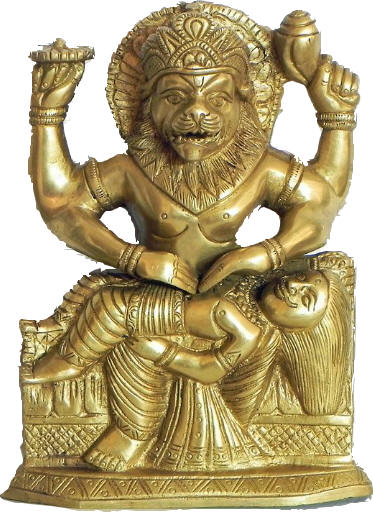AreWeSwamy
By Periyava
Are We Swamy? If not…Deivathin Kural Part 1-03
http://www.kamakoti.org/tamil/part1kurall03.htm
Srī Ādhi Saṅkarar
says We ourselves are Swamy. Hiraṇyakaśipu said, “I am Swamy.” Swamy
himself came as Narasimam and did Samhāram -killing-of the self-declared
egoistic Hiraṇyakaśipu. Is
Saṅkara’s
claim “We are Swamy” like that of Hiraṇyakaśipu?
No, Nada, Never.
Hiraṇyakaśipu declared there was no God other than him out of his
inflated ego. Bhagavat Pāthar said there was nothing other than God. To
continue in that vein, we also are God. He asserts a person dissolves in
Braḥmam and becomes Braḥmam, if the Jīvaṉ eradicates the ego from
within. However, we feel in us the power of a teaspoonful of water as
compared to a mighty powerful and wide ocean, which is God. This tsp. of
water came from that ocean. This tsp. of water must submerge and
dissolve its ego of individualism in the ocean and become the ocean
itself.
If we are not Swamy, we must be something other than Swamy. If that is
so, it means there are objects other than Paramātman. Paramātman himself
is another object among zillion objects. It comes to mean that gazillion
objects exist. If that is so, it is inapplicable he is Paramātman or
Swamy. Only when he is all in
one Sakthi, he is Swamy. If he is all, could we be separate from him?
The 'Advaitins' apparent egoism and external posture of ‘Swamy we
are’ do not diminish the greatness of Swamy. The Advaitins declare with
humility, ‘Jīvaṉ is not Swamy; the former is insignificant; Swamy is a
Supreme Substance (Supreme Being). Jīvan is different; Swamy is
different.’ They sometimes in a careless manner make Swamy one among
many objects and diminish his greatness.
He is Sakalam (One appearing as many) and we must be him (by
implication and in reality).
He being the vast ocean himself is water in the
river, lake, well, large vessel, small vessel, and the teaspoon. God
makes his Sakthi into small entities and live in many Jīva Janthus
(Beings with soul). When
the soul acquires a human body, man experiences merits and demerits.
Once the resolution of Karma takes place, God makes it possible for man
to become God. On becoming man, God gives him the mind and the will to
earn sin and merit and experience the fruits thereof.
When the mind is in oscillation, we can’t realize
‘we are him’ at the outset and attain a state free from sin and merit.
Though he is purportedly us, we are in a state of seeking his grace, for
us to experience and earn freedom from sin and merit. He is great and
powerful Swamy. We are insignificant Jīvaṉ.
He is the vast ocean. We are a teaspoon of water; with that
thought initially, we remain compelled to show Bakthi (devotion) to
Swamy.
The mind given to us by Swamy makes us different
from him. The mind will not quit initially. Being in that state of mind,
we should cling on to Swamy. He created the mind as a monkey. That
mind-monkey holds on to the body firmly. But, Swamy gave us the body
only to crush and destroy it. The mind-monkey should give up this rotten
fruit. The monkey upon getting a good fruit will give up the rotten one.
The fragrant, ripe and delicious fruit is Paramātma.
Clinging to it with the mind and giving up the body consciousness
should be our goal and practice. For
this purpose alone, we have Bakthi (devotion), Pūjā, Kṣētrātanam
(pilgrimage)… By progressive attainment of purification, maturation, and
complete eradication of body consciousness and egoism, Paramātmā-Jīvātmā
divergence will dissipate, Swamy becomes us and we enjoy Advaitam. We
will attain the experience of Aruṇagirināthar, ‘You and I are
non-different.’
